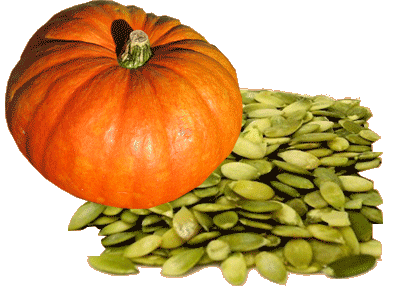| |
Pumpkin Seed Oil (Cucurbita Pepo)

|
Virgin
(Unrefined) Pumpkin Seed Oil is is cold-pressed from Cucurbita Pepo
seeds, with an appearance that is darker in color than a refined
material and carries a characteristic odor and taste.
It
appears that the biggest skin benefits of pumpkin seed oil are that it
possesses very high levels of the natural antioxidants and
polyunsaturated fatty acids. Pumpkin seed oil is especially high in the
gamma-tocopherol form of Vitamin E, which is a powerful antioxidant,
that improves wound healing, reduces the appearance of stretch marks on
skin, minimizes the impact of psoriasis, eczema, and rosacea.
The
antioxidants in Pumpkin Seed Oil protect cell structure and health by
neutralizing "free radicals", which are unstable molecules generated
from sources like radiation, air pollution, and peroxides, thus
diminishing wound scarring, wrinkles and fine lines, helping the skin
retain its normal structure.
The four fatty acids which comprise 98% of Pumpkin Seed Oil are palmitic, stearic, linoleic, and oleic acids.
Palmitic acid in Pumpkin Seed Oil works to promote skin cell regeneration and help retain its protective barrier.
Stearic
acid in Pumpkin Seed Oil acts primarily as a lubricant. It allows the
skin to retain the proper moisture balance vital for good health (and
good looks).
Linoleic
acid in Pumpkin Seed Oil is an essential fatty acid, which means our
bodies don't manufacture it, and so we must ingest it in our diets.
Linoleic acid is one step for the manufacture of prostaglandins, which
decrease inflammation in the body. Linoleic acid helps maintain smooth
skin, and will help repair flaky, itchy, or rough skin.
Oleic
acid in Pumplin Seed Oil is the final fatty acid found in pumpkin seed
oil. It works to replenish and maintain skin's moisture and lubrication.
It is an Omega 9 acid and has similar health benefits as the more
well-known Omega 3 and Omega 6 essential fatty acids.
Pumpkin
Seed Oil has significant benefits for skin health and skin care. With
powerful antioxidants, and essential fatty acids, it appears that adding
pumpkin seed oil to your skin care regimen will help you retain
moisture, maintain normal cell structure, and keep your skin looking and
feeling healthy.
History of Pumpkin Seeds
■Pumpkin seeds were discovered by archaeologists in caves in Mexico that date back to 7,000 B.C.
■North
American tribes were the very first to observe the particular miracle
in pumpkin seeds. Pumpkins and their seeds were an important Native
American Indian food used for their dietary and medicinal properties.
■Pumpkin seeds are called pepitas in Mexico and they are a trademark of Mexican cuisine.
■Pumpkin seeds were very popular in ancient Greece.
■The
nutrition in pumpkin seeds improves with age; they are among the few
foods that increase in nutritive value as they decompose. According to
tests made at the Massachusetts Experimental Station, squash and
pumpkin seeds stored for more than five months show a marked increase
in protein content.
■Pumpkin seeds are high in calories, about 559 calories per 100 g.
Nutritional Facts & Health Benefits
Pumpkin seeds:
■Are filled with lots of minerals including phosphorus, magnesium, manganese, iron and copper.
■Contain phytosterols, compounds that that have been shown to reduce levels of LDL cholesterol.
■Contain
L-tryptophan, which helps with good sleep and lowering depression.
Tryptophan is converted into serotonin and niacin. Serotonin is also
very helpful in helping us to have a good night’s sleep.
■Are
high in zinc, making them a natural protector against osteoporosis.
Low intake of zinc is linked to higher rates of osteoporosis. In a
study of almost 400 men (age from 45-92) published in the American
Journal of Clinical Nutrition they found a correlation between low
dietary intake of zinc, low blood levels of the trace mineral and
osteoporosis at the hip and spine.
■Are a good source vitamin E; they contain about 35.10 mg of tocopherol per 100 g.
■Are the most alkaline-forming seed.
■Are
an excellent source of vitamin B group (thiamin, riboflavin, niacin,
pantothenic acid, vitamin B-6 (pyridoxine) and folates).
■Contain good quality protein. 100 g seeds provide 30 g.
■According to studies, pumpkin seeds prevent calcium oxalate kidney stone formation.
■Reduce inflammation for arthritis without the side effects of anti-inflammatory drugs.
■Are used in many cultures as a natural treatment for tapeworms and other parasites.
■Are good for prostate health! The oil in pumpkin seeds alleviates difficult urination that happens with an enlarged prostate.
Disclaimer: The information presented
herein is intended for educational purposes only. These statements have not
been evaluated by the FDA and are not intended to diagnose, cure, treat or
prevent disease. Individual results may vary, and before using any supplements,
it is always advisable to consult with your own health care provider.
|
|


















